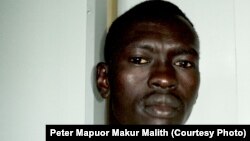JUBA, SOUTH SUDAN —
A radio station in South Sudan's Lakes state resumed broadcasts this week after it was shut down for three days by state authorities who alleged the station was not properly licensed.
But Catholic Good News radio aired only music when it came back on stream, with staff at the Rumbek-based station saying they were too afraid to broadcast any news and rights groups saying the shutdown of the station was aimed at intimidating journalists and was politically motivated.
"The reporters at the station, they are afraid of operating independently as they used to. Since the radio re-opened, it has been only been running music," said program manager Peter Mapuor Makur Malith who was relieved of his duties at the station after the interruption of broadcasts.
“I was issued with a suspension letter by the diocese of Rumbek, signed by the diocesan administrator, without charges leveled against me as a program manager or as a reporter or as a presenter. I have not been briefed on what led to the decision," Makur Malith said.
Lakes state officials said they closed the station temporarily because its management had not correctly filed for a license.
But Makur Malith insisted all of the station's paperwork had been filed with the authorities.
Human rights advocates have launched an investigation into the closure of the station, which they condemned as harassment of the media.
Biel Boutros Biel, the executive director of human rights watchdog South Sudan Human Rights Society for Advocacy, said he believes the radio station was shut down in response to controversial programs it aired last month, including an investigation into the death of an inmate in Rumbek prison under questionable circumstances.
He also said the station has been broadcasting songs that support former state leaders who were abruptly replaced in January when South Sudanese President Salva Kiir appointed Matur Chut Dhoul as interim military governor in Lakes state.
Good News Radio broadcasts mainly civic education and evangelical programs, in English and Dinka.
Lakes state Information Minister Dut Makoi Kuok denied the state government was targeting journalists when it closed the station.
But Catholic Good News radio aired only music when it came back on stream, with staff at the Rumbek-based station saying they were too afraid to broadcast any news and rights groups saying the shutdown of the station was aimed at intimidating journalists and was politically motivated.
"The reporters at the station, they are afraid of operating independently as they used to. Since the radio re-opened, it has been only been running music," said program manager Peter Mapuor Makur Malith who was relieved of his duties at the station after the interruption of broadcasts.
“I was issued with a suspension letter by the diocese of Rumbek, signed by the diocesan administrator, without charges leveled against me as a program manager or as a reporter or as a presenter. I have not been briefed on what led to the decision," Makur Malith said.
Lakes state officials said they closed the station temporarily because its management had not correctly filed for a license.
But Makur Malith insisted all of the station's paperwork had been filed with the authorities.
Human rights advocates have launched an investigation into the closure of the station, which they condemned as harassment of the media.
Biel Boutros Biel, the executive director of human rights watchdog South Sudan Human Rights Society for Advocacy, said he believes the radio station was shut down in response to controversial programs it aired last month, including an investigation into the death of an inmate in Rumbek prison under questionable circumstances.
He also said the station has been broadcasting songs that support former state leaders who were abruptly replaced in January when South Sudanese President Salva Kiir appointed Matur Chut Dhoul as interim military governor in Lakes state.
Good News Radio broadcasts mainly civic education and evangelical programs, in English and Dinka.
Lakes state Information Minister Dut Makoi Kuok denied the state government was targeting journalists when it closed the station.




